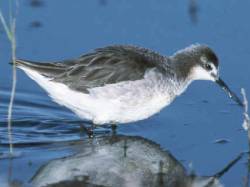|
Wilson's Phalarope (Phalaropus tricolor) - wiki
| 제목: | Wilson's Phalarope (Phalaropus tricolor) - wiki
| |

| 해상도: 250x187
파일크기: 7549 Bytes
등록시간: 2007:08:27 10:34:20
|
Wilson's Phalarope
From Wikipedia, the free encyclopedia
[Photo] Wilson's Phalarope from US FWS. Source: Klamath Basin National Wildlife Refuges, US Fish & Wildlife Service
The Wilson's Phalarope, Phalaropus tricolor, is a small wader. This bird, the largest of the phalaropes, breeds in the prairies of North America in western Canada and the western USA. It is migratory, wintering in South America. It is a rare vagrant to western Europe.
Wilson's Phalaropes are unusually halophilic (salt-loving) and feed in great numbers when on migration on saline lakes such as Mono Lake in California and the Great Salt Lake of Utah, often with Red-necked Phalaropes.
Wilson's Phalarope is about 23 cm in length, with lobed toes and a straight fine black bill. The breeding female is predominantly gray and brown above, with white underparts, a reddish neck and reddish flank patches. The breeding male is a duller version of the female, with a brown back, and the reddish patches reduced or absent.
Young birds are grey and brown above, with whitish underparts and a dark patch through the eye. In winter, the plumage is essentially grey above and white below, but the dark eyepatch is always present.
The typical avian sex roles are reversed in the three phalarope species. Females are larger and more brightly coloured than males. The females pursue males, compete for nesting territory, and will aggressively defend their nests and chosen mates. Once the females lay their eggs, they begin their southward migration, leaving the males to incubate the eggs. Three to four eggs are laid in a ground nest near water. The young feed themselves.
When feeding, a Wilson's Phalarope will often swim in a small, rapid circle, forming a small whirlpool. This behaviour is thought to aid feeding by raising food from the bottom of shallow water. The bird will reach into the outskirts of the vortex with its bill, plucking small insects or crustaceans caught up therein.
Although very common, this bird's population may have declined in some areas due to the loss of prairie wetland habitat. A few staging areas are of critical importance during migration.
This species is often very tame and approachable. Its common name commemorates the American ornithologist Alexander Wilson.
http://en.wikipedia.org/wiki/Wilson%27s_Phalarope
| The text in this page is based on the copyrighted Wikipedia article shown in above URL. It is used under the GNU Free Documentation License. You may redistribute it, verbatim or modified, providing that you comply with the terms of the GFDL. |
|
^o^
동물그림창고 똑똑전화 누리집
^o^
|
|